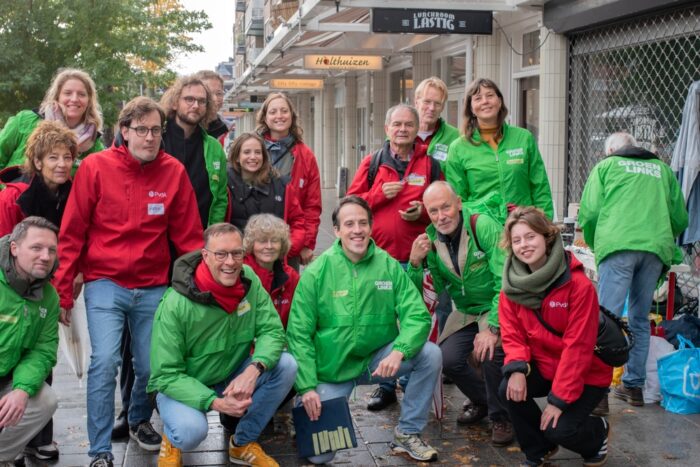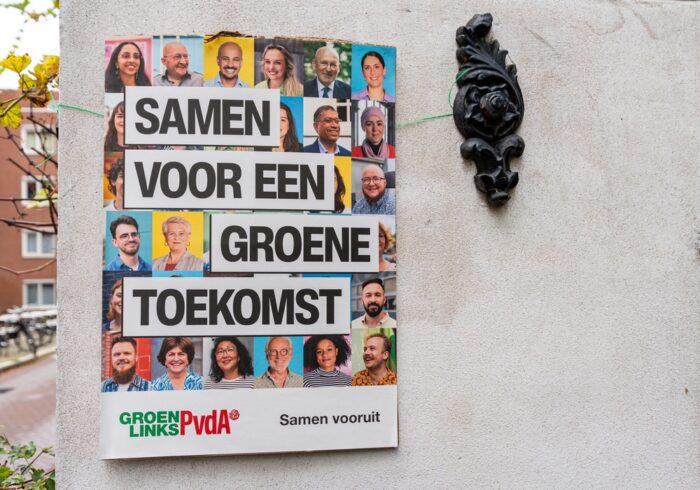Find all related Progressive Post
Progressive Post

For Romania, 2024 was, as many called it, a year of super-elections. Four rounds of elections in just a little over six months. No big deal, half of the world has had elections in 2024. But this time, Romania’s political landscape was shaken on 24 November 24, by the unexpected results of the first round of the presidential elections, won by an independent candidate. While it is notable that Calin Georgescu is independent, the main headline is a clear sign of the political advance of the far/populist right, further made clear by AUR’s performance in the parliamentary elections. It was a lesson, I hope, learned by all Romanian political parties and institutions.
Parliamentary elections took part in Romania on 1 December, after the first round of presidential elections. The first thing to note is that the whole year marked by uncertainty about the dates of the elections: from the local elections scheduled for autumn and then rescheduled for June, along with the ones for the European elections, the decision to have the presidential and the parliamentary elections in three consecutive Sundays late November – early December just was not a good choice. Civil society organisations, political analysts – many in the field criticised the government for organising the elections so close to each other, not even mentioning the parliamentary elections to happen on Romania’s national day, 1 December.
The reasoning was not just because it would be a logistical burden on the electoral bodies, which it clearly was, but also that the time would not allow political debates and proper preparation of the parties and candidates. And so it happened. The parliamentary elections were almost completely overshadowed by the presidential elections. The little existing debate on policies or priorities was substituted with personal attacks on the different candidates. Too few issues and priorities were presented, and too many criticisms of the other (person) happened. Nevertheless, the results of the first round of the presidential elections had its say on the parliamentary elections.
An analysis on social media by Cristian Andrei (Agentia de Rating Politic) shows that the presidential elections have helped mainly the far-right, nationalist parties, generating the so-called bandwagon effect. In his post, Andrei shows how many votes each party lost or won, based on their presidential candidate preferences. The main losers of the bandwagon effect were the mainstream parties, USR and AUR included. He also mentioned the underdog effect, mainly on the smaller parties, who do not have a candidate in the runoffs, to gain support – and this was seen by the growth of two smaller, pro-European, pro-new issues (environment, mental health, gender equality, education) parties, not enough though to secure the 5 per cent threshold and be represented in the parliament. The underdog effect also helped two nationalist, far-right parties either increasing (SOS Romania), or receiving over 6 per cent from nowhere (POT). Also, the decision to recount the votes, and the Constitutional Court postponing its decision concerning the quest for annulling the first round of the presidential elections was something disturbing, making citizens wonder if any of the state institutions is properly functioning.
When it comes to voting preferences based on gender, age or studies, very little information is yet available, so it is hard to say how women or young people voted and how the urban and the rural people were mobilised. The only exit poll made by CURS for the parliamentary elections shows that almost the same percentage of young people (age 18-30) voted for AUR and USR. Official figures show that only half of the younger voters (age 18-24) cast their votes, but the overall turnout was 52.5 per cent, much higher than in the last parliamentary elections (where participation stood at a little below 32 per cent). An explanation for the 2020 turnout can be the circumstances of the year – Covid-19, and the uncertainty resulting from the pandemic, but participation in parliamentary elections in Romania for the past several cycles was always around 35 per cent.
This time, the explanation for the high turnout for the 2024 parliamentary elections takes us to a different dimension: fear. On one hand, there is the fear of voting for the same mainstream parties which were not successful in communicating with the citizens over the past 20 years, nor in representing them properly. These people voted for new, anti-system parties, that were either on the far-right, sovereigntist or nationalist platforms, or tied to a pro-European, pro-values, pro-diversity agenda. On the other hand, the fear of having extremist, nationalist forces lead Romania’s parliament and, implicitly, the government. Mainly, the voters between 31-60 years voted for the so-called ‘stability’ we were used to: PSD and PNL. The ones above 61, in high numbers voted for the left they know: PSD.
None of these two fear-scenarios is a winner, as fear is never a good advisor. Society is divided, and the void left behind by all parties seems to be filled by political actors who used sentiments and fear (of not being heard, of diversity) to mobilise. Social platforms were used to propagate the messages, messages that were so mobilising that even in rural areas with less access to social media, people voted for them. The diaspora, who, in the past, voted overwhelmingly for pro-European values and candidates representing these values, voted for parties which represented the other side.
I hope that after this lesson, all parties seriously analyse their own mistakes, and try to see deeper under the surface. They will need to find ways to reach out to those who feel left behind, to understand the rationale behind their vote, and try to do what they should do – represent all their constituencies in all institutions: parliament, government, central and local – and all the other institutions that were created to serve the citizens, not to leave them behind.
Photo credits: Shutterstock.com/Bogdan Totoran
| Cookie | Duration | Description |
|---|---|---|
| cookielawinfo-checkbox-advertisement | 1 year | Set by the GDPR Cookie Consent plugin, this cookie is used to record the user consent for the cookies in the "Advertisement" category . |
| cookielawinfo-checkbox-analytics | 11 months | This cookie is set by GDPR Cookie Consent plugin. The cookie is used to store the user consent for the cookies in the category "Analytics". |
| cookielawinfo-checkbox-functional | 11 months | The cookie is set by GDPR cookie consent to record the user consent for the cookies in the category "Functional". |
| cookielawinfo-checkbox-necessary | 11 months | This cookie is set by GDPR Cookie Consent plugin. The cookies is used to store the user consent for the cookies in the category "Necessary". |
| cookielawinfo-checkbox-others | 11 months | This cookie is set by GDPR Cookie Consent plugin. The cookie is used to store the user consent for the cookies in the category "Other. |
| cookielawinfo-checkbox-performance | 11 months | This cookie is set by GDPR Cookie Consent plugin. The cookie is used to store the user consent for the cookies in the category "Performance". |
| csrftoken | past | This cookie is associated with Django web development platform for python. Used to help protect the website against Cross-Site Request Forgery attacks |
| JSESSIONID | session | The JSESSIONID cookie is used by New Relic to store a session identifier so that New Relic can monitor session counts for an application. |
| viewed_cookie_policy | 11 months | The cookie is set by the GDPR Cookie Consent plugin and is used to store whether or not user has consented to the use of cookies. It does not store any personal data. |
| Cookie | Duration | Description |
|---|---|---|
| __cf_bm | 30 minutes | This cookie, set by Cloudflare, is used to support Cloudflare Bot Management. |
| S | 1 hour | Used by Yahoo to provide ads, content or analytics. |
| sp_landing | 1 day | The sp_landing is set by Spotify to implement audio content from Spotify on the website and also registers information on user interaction related to the audio content. |
| sp_t | 1 year | The sp_t cookie is set by Spotify to implement audio content from Spotify on the website and also registers information on user interaction related to the audio content. |
| Cookie | Duration | Description |
|---|---|---|
| CONSENT | 2 years | YouTube sets this cookie via embedded youtube-videos and registers anonymous statistical data. |
| iutk | session | This cookie is used by Issuu analytic system to gather information regarding visitor activity on Issuu products. |
| s_vi | 2 years | An Adobe Analytics cookie that uses a unique visitor ID time/date stamp to identify a unique vistor to the website. |
| Cookie | Duration | Description |
|---|---|---|
| NID | 6 months | NID cookie, set by Google, is used for advertising purposes; to limit the number of times the user sees an ad, to mute unwanted ads, and to measure the effectiveness of ads. |
| VISITOR_INFO1_LIVE | 5 months 27 days | A cookie set by YouTube to measure bandwidth that determines whether the user gets the new or old player interface. |
| YSC | session | YSC cookie is set by Youtube and is used to track the views of embedded videos on Youtube pages. |
| yt-remote-connected-devices | never | YouTube sets this cookie to store the video preferences of the user using embedded YouTube video. |
| yt-remote-device-id | never | YouTube sets this cookie to store the video preferences of the user using embedded YouTube video. |
| yt.innertube::nextId | never | This cookie, set by YouTube, registers a unique ID to store data on what videos from YouTube the user has seen. |
| yt.innertube::requests | never | This cookie, set by YouTube, registers a unique ID to store data on what videos from YouTube the user has seen. |
| Cookie | Duration | Description |
|---|---|---|
| COMPASS | 1 hour | No description |
| ed3e2e5e5460c5b72cba896c22a5ff98 | session | No description available. |
| loglevel | never | No description available. |


